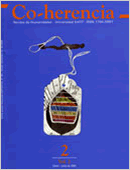Lenguajes políticos y construcción de identidades
Main Article Content
Keywords
Lenguajes políticos, identidad nacional, narratividad
Resumen
Este texto se plantea el papel del lenguaje en la transmisión histórica de las ideas políticas y sus vínculos con la génesis narrativa de identidades colectivas. Como objeto de estudio se toma la construcción de las identidades nacionales a partir de la narración histórica, analizando el parentesco estructural entre los relatos historiográficos y los relatos míticos articulados por las ideologías nacionalistas del siglo XIX. El artículo concluye con una reflexión sobre la peculiar naturaleza de las identidades nacionales y su dependencia de una reconstrucción ad hoc de la historia.
Descargas
Referencias
Colom, Francisco (1998) Razones deidentidad. Barcelona, Anthropos.
Gellner, Ernest (1988) Naciones ynacionalismo. Madrid, AlianzaEditorial.
Juarista, Jon (1997) El buclemelancólico. Historias de nacionalistasvascos. Madrid, Espasa Calpe.
Pluma, John H. (1974) La muerte del pasado. Barcelona, Barral.
Kuhn, Thomas H. (1975) Laestructura de las revolucionescientíficas. Fondo de Cultura Económica, México.
Pocock, John G. (1984) “Verbalizinga Political Act”, en: M. Shapiro(ed.):Language and Politics, Oxford, Basil Blackwell.
Pocock, John G. (1987) “The Concept of Language and the métier d’historien:some Considerations on Practice”,En: A. Pagden (ed.) The Languages of Political Theory in Early-Modern Europe. Cambridge, University Press.
Renan, Ernest (1992) Qu’est-cequ ́une nation?, Bizou, Presses Pocket.
Ricoeur, Paul (1987) Tiempo y narración. Madrid, Ediciones Cristiandad.
Smith, Anthony D. (1983) Theories of Nationalism. London, Ducksworth.
Walzer, Michael (1985) Exodus and Revolution. New York, Basic Books.
White, Hyden (1992) Metahistoria. La imaginación histórica en la Europa del siglo XIX. México, Fondo de Cultura Económica. Lenguajes políticos y construcción de identidades, Francisco Colom González
